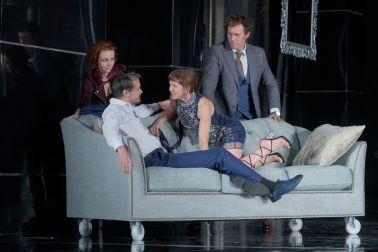25. 09. 2018
THE PREMIERE OF SHAKESPEARE’S THE MERCHANT OF VENICE AT THE HUNGARIAN THEATRE OF CLUJ
The Hungarian Theatre of Cluj is prepairing its first premiere of the season, namely Shakespeare’s The Merchant of Venice, directed by Gábor Tompa. The opening night of the production will take place in the Main Hall on Friday, September 28, at 7 pm. Next performances: Sunday, September 30, and Friday, October 5. Tickets can be purchased at the theatre’s ticket office and online at www.biletmaster.ro.
Gábor Tompa considers The Merchant of Venice to be one of Shakespeare’s most complex and difficult works, which has launched various delicate debates throughout the different historical contexts it has been played. His staging takes place within the world elite of monetary power, where profit is the only god. This ostentatiously wealthy society is driven by interests. The production takes place in the high-tech cold space of modern technology, which, in contrast, makes way for enormous passions: love, betrayal, vengeance, selfishness, narcissism, rebellion. Tompa hopes that the work defined by Shakespeare as a satirical comedy will be able to trigger antagonistic sentiments from the audience, depending on the character one feels most compassionate toward in any given scene.
Playwright András Visky addressed the Jewish problem arising in the drama. Shakespeare created the stereotypical portrait of the Jew in a historic context and time where the establishment of Jews on the territory of England was prohibited. In the play, Shylock is portrayed as a flesh-and-blood human being, who eventually becomes a victim of the system.
Set and Costume designer: Dragoş Buhagiar; Playwright: András Visky; Assistant to the Director: Botond Nagy, Emőke Veres. Video: András Rancz. Lighting design: László Erőss. Assistant to the Costume Designer: Gyopár Bocskai. Stage Manager: Emőke Veres, Réka Zongor.
Cast: Gábor Viola, Balázs Bodolai, Ervin Szűcs, Loránd Farkas, Szabolcs Balla, Péter Árus, Enikő Györgyjakab, Andrea Vindis, Csilla Albert, Alpár Fogarasi, Zsolt Bogdán, Éva Imre, Róbert Laczkó Vass, Csaba Marosan, Attila Orbán, Áron Dimény, Loránd Váta, Paco Alfonsín, Ferenc Sinkó, Melinda Kántor, János Platz.









